Give me your Fangorns and your Lothloriens, your Green Hearts and your Elvandars. Evoke your Haunted Forest Beyond the Wall complete with creepy weirwoods, your Steddings and your Avendesoras. Send me pleasant dreams about Totoro’s Japanese Camphor and the Forest Spirit’s kodama-filled canopy. Or, y’know, tree cities full of Wookiees instead of elves. I will take them all!
Forests in speculative fiction novels have a special place in my heart. Especially tree-cities.
In real life, all forests seem magical to me. I can’t think of a culture that has not populated them with myths or religious figures. In Australia, First Nations people will tell you about ancient spirits dwelling in our forests whether tropical, temperate or dry. Proud Lebanese will tell you that their cedar forests were used for Solomon’s Temple and to build Noah’s ark. They may not know that those same cedar forests appeared in the Epic of Gilgamesh, circa 2100 BC. Those heroes fought off monsters and cut down the trees. In contrast, the characters of Dan Simmons’ Hyperion travel on treeships beyond the stars…
Take me there. I’m with you! As long as trees are, too.
Here are a mere eight of my favourite fictional forests:
The Magic Faraway Tree by Enid Blyton
When telling people I’ve written a novel about a magical forest, the most common response so far has been: “You mean like The Magic Faraway Tree?” This staple of English-speaking childhoods was indeed beloved by my smallish self, not only for the magic tree which grew all kinds of leaves, fruit and nuts on the one plant but the vast cast of magical creatures which made the tree their home.
Buy the Book
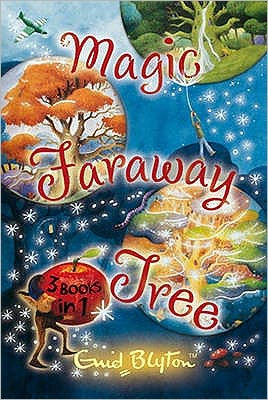

The Magic Faraway Tree
The Jungle Books by Rudyard Kipling
Of course, the jungles of the subcontinent aren’t fictional. It’s just that this was the first book where I saw a wilderness treated remotely in fiction like an ally and protector, with its own languages and laws, instead of a hostile thing to be conquered. Wiser people than I have much valid criticism to heap on this book, and yet I still sometimes dream of stretching out on a rainforest limb beside Bagheera and Baloo.
Buy the Book
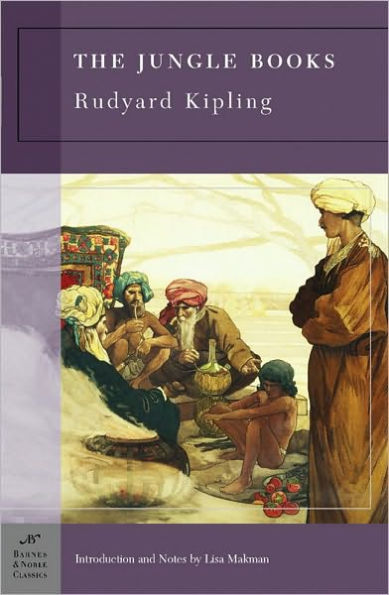

The Jungle Books
Robin Hood
Ah, Sherwood Forest. Again, a real forest, populated by larger than life characters. Sherwood has been a forest since the end of the last ice age, apparently, and yet one man, the King of England, “owned” every deer in it. Ha! I have my suspicions about what the druids would have had to say about that. Ancient oaks, here as elsewhere, form the heart of this forest, including the one that famously served as the archer-thief’s hideout.
Buy the Book
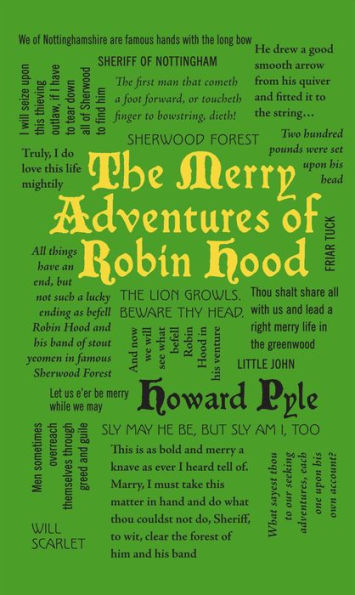

The Merry Adventures of Robin Hood
The Hobbit and The Lord of the Rings by J. R. R. Tolkien
The Hobbit and The Lord of the Rings seem to be about dwarves, elves and metaphors for sensible, down-to-earth English folk, but really, it’s all about the trees. More, it’s about how trees are good and the industrial revolution is bad.
Tolkien lovingly names and describes them—oak, ash, beech, birch, rowan, willow. Tom Bombadil, a forest god, and Goldberry, a river goddess, seem the only incorruptible aspects of Middle Earth. Baddies cut trees down. Goodies, in contrast, reside in or amongst trees. Or hide in them from wargs. Galadriel’s magic sustains the Mallorn trees of Lothlorien which, instead of losing their leaves, turn golden and glitter. These trees, along with others of Mirkwood, the Old Forest and Fangorn can accumulate wisdom, act in the interests of good or evil, and are as beautiful, vital and alive as the speaking characters.
Buy the Book
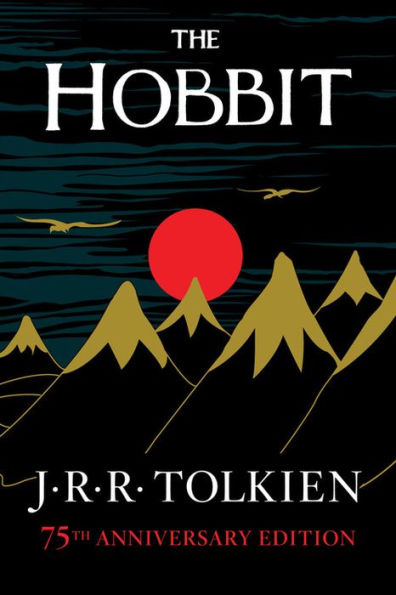

The Hobbit
The Lorax by Dr. Seuss
“I am the Lorax, I speak for the trees!”—yes, I have been known to utter this in despair at parties when developers ask in all innocence why I don’t seem excited by the innovative architectural design. Even a toddler can grasp that when the last truffula tree is cut down, and the swomee-swans, humming fish and bar-ba-loots are gone, all the money in the world can’t save your soul, and it doesn’t matter that the glorious truffula forest is completely made up.
Buy the Book
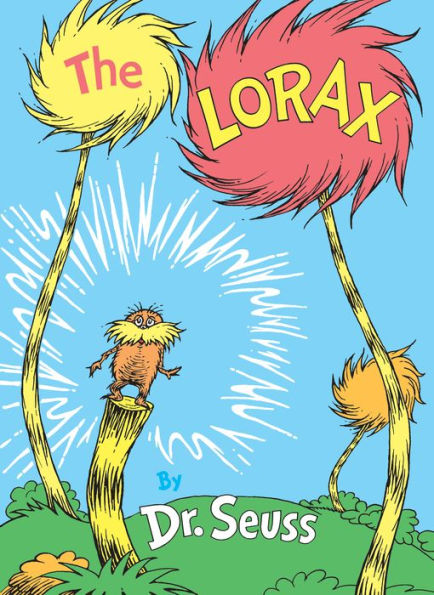

The Lorax
The Word for World is Forest by Ursula K. Le Guin
The title says it all, really (it’s a great title, isn’t it?) With it, Le Guin reminds us that our home planet is “Earth.” In many science fiction stories, including this one, we appear as “Terrans.” We’re all about the dirt, not the ecosystems supported by it, not just because agriculture is the basis of Western civilisation but because our religions or philosophies of superiority rely on separating ourselves from “lower” forms of life.
Buy the Book
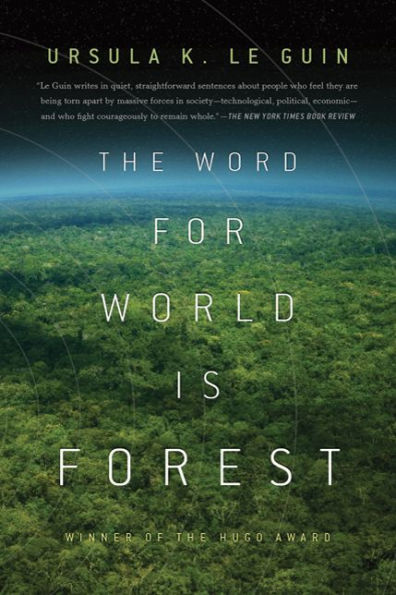

The Word for World Is Forest
Walking the Tree by Kaaron Warren
The title says a lot here, too. In this fantasy world, Botanica, a continent dominated by a single mammoth tree is circumnavigated by girls in a five-year-long rite of passage. Walking the Tree is a strange and beautiful book with a complicated, likeable protagonist to keep us company on our journey across the colourful patchwork of her world.
Buy the Book
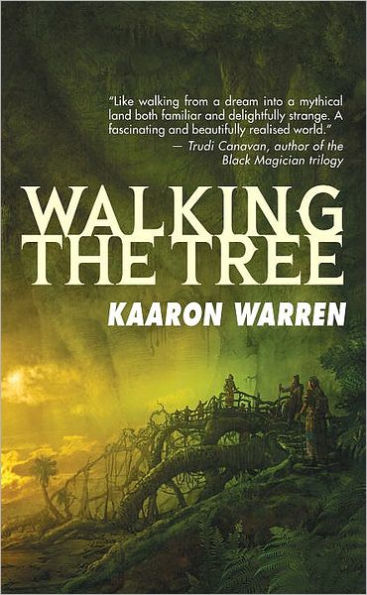

Walking the Tree
The Broken Kingdoms by N. K. Jemisin
Like Warren’s work, the second book of Jemisin’s Inheritance trilogy is set beneath the canopy of a single, enormous tree. I loved the transformative power of this tree, the monolithic inability to ignore it. The rustle of its leaves was part of the music of this rather musical book—the main character couldn’t see—and the roots and branches grew and disturbed the order of the city of Shadow. But also, as with the Warren, the tree was a power that divided people, as opposed to bringing them together.
Buy the Book
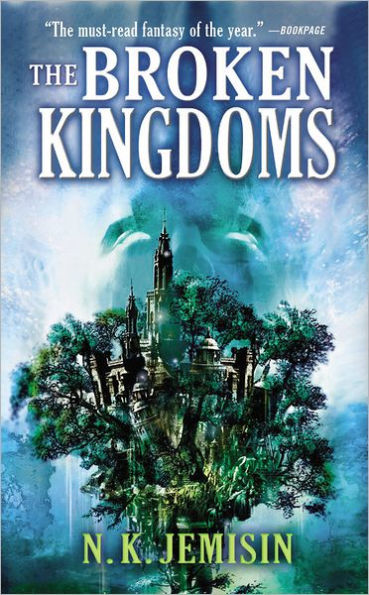

The Broken Kingdoms
This article originally appeared in the Tor/Forge newsletter in February 2017.
Read an excerpt from Thoraiya Dyer’s Crossroads of Canopy here.
 Thoraiya Dyer is an Aurealis and Ditmar award-winning, Sydney-based writer and lapsed veterinarian. Her short science fiction and fantasy has appeared in Clarkesworld, Apex, Cosmos, Analog and various Australian and US anthologies. Four of her original stories are collected in “Asymmetry,” available from Twelfth Planet Press. Her Titan’s Forest series—Crossroads of Canopy, Echoes of Understorey, and Tides of the Titans—is available from Tor Books. She is @ThoraiyaDyer on Twitter.
Thoraiya Dyer is an Aurealis and Ditmar award-winning, Sydney-based writer and lapsed veterinarian. Her short science fiction and fantasy has appeared in Clarkesworld, Apex, Cosmos, Analog and various Australian and US anthologies. Four of her original stories are collected in “Asymmetry,” available from Twelfth Planet Press. Her Titan’s Forest series—Crossroads of Canopy, Echoes of Understorey, and Tides of the Titans—is available from Tor Books. She is @ThoraiyaDyer on Twitter.










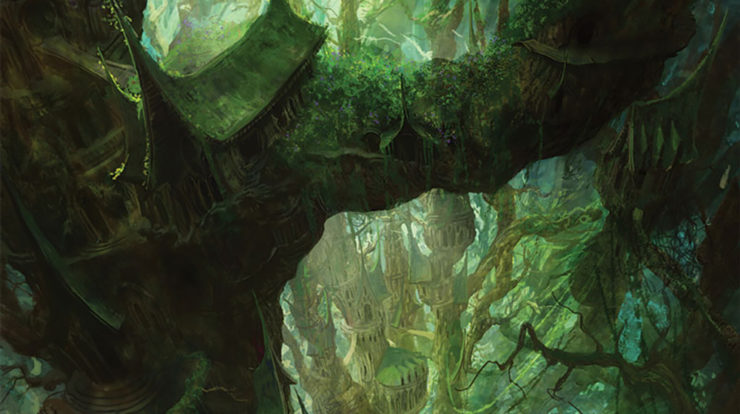
No ‘Lavondyss’? Okay, the forest is weird, has all sorts of unusual features and denizens plus is distinctly not exactly safe. But I’d risk it.
Garroting Deep from the Covenant books is about as haunting as you can get. Dem trees will eat you.
Brian Aldiss’s Hothouse.
Mercedes Lackey’s ‘Heralds of Valdemar’ series featured the Forest of Sorrows, which protected the northern border of Valdemar from invasion and the deadly Pelagirs (which was the fantasy equivalent of radioactive and filled with mutated creatures).
“Midworld” from Alan Dean Foster’s Homanx books. I remember being very impressed by the jungle world due to its scale and deadlines when I first read the book (a millennium ago).
Always a fan of C.S. Lewis’ Wood Between the Worlds. Even if The Magician’s Nephew isn’t your favorite, there’s something delicious about the serenity of that place.
The Hobbit and The Lord of the Rings seem to be about dwarves, elves and metaphors for sensible, down-to-earth English folk, but really, it’s all about the trees…Tom Bombadil, a forest god, and Goldberry, a river goddess, seem the only incorruptible aspects of Middle Earth. Baddies cut trees down. Goodies, in contrast, reside in or amongst trees.
As always when Tor writes about Tolkien, “it’s more complicated than that”.
Sure, Orcs cut down trees.
But so do Hobbits (the Brandybucks cut back a great strip of the Old Forest and burned the trees they felled). And Beorn the skinchanger. And Gimli (“Take care to set your axe to the right tree!” Galadriel admonishes him.)
The point is that Orcs cut them down out of sheer lust for destruction – like they do everything else.
And, yes, Treebeard and Galadriel and Bombadil live in or amongst trees.
But so do venomous giant spiders, and Old Man Willow, and Sauron himself (at Dol Guldur).
Forests for Tolkien are places of mystery and transition; no one ever comes out of one quite the same as they went in. But it’s far more nuanced than “trees good”.
I always loved the Color of Distance by Amy Thompson with its arboreal view of living in a rain forest. Love the alien’s method of communication with changing colors and symbols on their skin. Too bad the book is out of print.
https://en.m.wikipedia.org/wiki/The_Color_of_Distance
How about the Integral Trees by Larry Niven? https://en.wikipedia.org/wiki/The_Integral_Trees
And how can we forget the Evergreen Forest. Quiet, peaceful, serene… I think a lot of kids would have willingly taken up residence in it at some point in their childhood.
Come, run with us.
https://www.youtube.com/watch?v=DEkSzcGIfW0
The Enchanted Forest in Patrcia Wrede’s Chronicles of the same name (although I always think of them as the “Dealing With Dragons” books).
Harry Potter’s Forbidden Forest, and its close cousin, Simon Snow’s Wavering Wood.
Cabeswater, the sometimes-there forest of Maggie Stiefvater’s “Raven Cycle.”
Ros Bearaigh, the wood where Mad King Sweeney perched in his yew tree: With these words there came the rending scream of a shattered stirk and an angry troubling of the branches as the poor madman percolated through the sieve of a sharp yew, a wailing black meteor hurtling through green clouds, a human prickles. (Flann O’Brien)
And, of course, the woods of Wonderland:
‘Cheshire Puss,’ she began, rather timidly … ‘Would you tell me, please, which way I ought to go from here?’
‘That depends a good deal on where you want to get to,’ said the Cat.
‘I don’t much care where—’ said Alice.
‘Then it doesn’t matter which way you go,’ said the Cat.
‘—so long as I get somewhere,’ Alice added as an explanation.
‘Oh, you’re sure to do that,’ said the Cat, ‘if you only walk long enough.’
True everywhere, but even more true in an enchanted forest.
Donald Moffitt’s Genesis Quest and Second Genesis are long out of print, but I will always love the voyage of reconstructed humanity crossing between galaxies, at relativistic speeds, in the giant space tree Yggdrasil, tied to a Bussard ramjet. That is breathtaking.
Oh, and dragonflies are despicable.
The first fictional forest I can remember falling in love with was the one described in Freckles by Gene Stratton-Porter. It wasn’t until many years later that I discovered this forest was not fictional but a very real area: The Limberlost Swamp in Indiana. I read and re-read this book when I was younger.
@srEDIT I *loooved* that book growing up, and it’s so rare to run into anyone else who remembers it. And absolutely – I’ve never been an “outdoors” person, but that book made me want to want to be one.
@@@@@ teancom: that book made me want to want to be one. Yup…me too! Yay! It’s so much fun to find someone else who loved it! I was so disappointed when my daughter preferred Girl of the Limberlost, which for me paled next to Freckles. That drunken butterflies scene is still vivid after 50 years!
The forest in The Vorrh
I may have pointed this out the last time this article was posted, but any list without Robert Holdstock’s Ryhope Wood is seriously deficient.